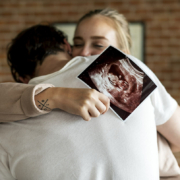What OBGYNs Say About Depression During Pregnancy
Many of the changes associated with pregnancy are things we can see, touch, and hear: a growing baby bump, that first flutter of kicks, your little one on the ultrasound screen sucking their thumb, or the rapid lub-dub of their heart through a fetal heart rate monitor.
Other changes that come with pregnancy, such as labile feelings, emotions and mental health concerns, are harder to observe or measure. As a result, they can often go unseen and untreated. Caring for your mental health — and looking out for signs of depression during pregnancy — is important for both you and your baby.
Already had your baby? Read Postpartum Depression: Everything You Need to Know
Mood Swings or Depression During Pregnancy?
Anyone’s emotions can be up one day and down the next, pregnant or not. It’s part of being human! But pregnancy can take those mood swings to a different level. And every woman, in every pregnancy, will experience those ups and downs in different ways and at different levels of intensity.
It’s normal to feel emotional ups and downs while pregnant. You may feel delighted and anxious, excited and exhausted, serene and stressed all in the same hour. You might feel like your body doesn’t seem like your own anymore while it’s changing size and shape. And you may have all kinds of unanswerable questions about your future and your baby’s future. On top of all that, your hormones fluctuate in different ways than when you’re not pregnant, leading to changes in appetite, energy and sleep.
It’s no wonder that mood swings are more common and pronounced during pregnancy!
However, for nearly 10% of pregnant women* in the U.S., that anxiety, exhaustion, and stress are more than just mood swings. When these symptoms interfere with daily life, they are reasons to seek help for depression.
(We believe the number of women experiencing depression during pregnancy is likely higher than 10%. It is not uncommon to have negative thoughts, emotions, and fears. It’s completely OK to bring these up with your doctor. In fact, we encourage you to share your concerns so that you can get the help you need.)
How to Tell the Difference Between Mood Swings and Depression
Symptoms of depression can include changes in sleep, energy, and appetite. But these symptoms could also be normal, pregnancy-related changes. That’s why it’s important to discuss any symptoms with your doctor. They’ll look for additional clues to see if what you are experiencing is “normal” or something more.
The following may suggest depression during pregnancy:
- History of depression — either before pregnancy or during a previous pregnancy
- Excessive anxiety — such as being so concerned about the wellbeing of your baby that it negatively affects your daily activities
- Poor self-esteem — such as excessive concern about the ability to be a good mother
- Despondency or hopelessness
- Lack of interest in things or people you used to enjoy
- Lack of response to support
- Interpersonal problems or domestic violence
- Non-adherence to antenatal care
- Using alcohol, illicit drugs, tobacco
- Poor weight gain due to decreased appetite and inadequate diet
- Suicidal ideation (thinking about suicide)
Your doctor will look for these five specific symptoms of major depression:
- Dysphoria — which means you feel sad, depressed, or anxious
- Anhedonia — which means lack of interest
- Excessive guilt or feelings of worthlessness
- Impaired concentration and decision making
- Suicidal ideation or behavior
Factors that Contribute to Depression in Pregnancy
While we can’t say definitively that one thing causes depression during pregnancy, OBGYNs know there are many contributing factors. The risk factors for depression during pregnancy include:
- Prior history of depression (whether while pregnant or not) seems to be the most important risk factor
- Current anxiety
- Unintended or unwanted pregnancy
- Life stress, including adverse life events (job loss, moving to a new place, death of a loved one) and socioeconomic status
- Intimate partner violence and lifetime history of physical and/or sexual abuse
- Poor social support
- Conflict, ineffective communication, and dissatisfaction with partner
- Chronic general medical conditions such as diabetes, migraines, obesity
- Single marital status
- Smoking
- Exposure to secondhand smoke
- Having had at least one prior birth
- Prior history of pregnancy / delivery complications (for example, miscarriage)
- Body image dissatisfaction
- Certain personality traits (anger, low self-esteem, neuroticism)
- Family history of depression
The Impact of Depression on Your Pregnancy
We know that depression can have an impact on your daily life and health — even when you’re not pregnant. Depression can lead to a compromised immune system, poor nutrition, and substance abuse.
When you’re pregnant, studies suggest that depression can affect not only you and your body but also your offspring. Some reasons depression could affect your child longer term include:
- Shared genetic factors — furthering the family history of depression to the next generation
- Epigenetic changes in the placenta and umbilical cord blood
- Changes in maternal and fetal central nervous system functioning
- Dysregulation of maternal hormones and increased fetal exposure to cortisol (cortisol is called the “stress hormone”)
- Not following prenatal care
- Poor nutrition
- Lack of exercise
- Substance use disorders
- Depression lasting even after pregnancy
Depression during pregnancy is also associated with a small increased risk of preterm birth or pregnancy loss. But it does not appear to be associated with the development of preeclampsia or gestational diabetes, or with NICU admission for the baby.
Depression, when left untreated, can continue to affect your baby and child as they grow and develop. Some studies suggest that risk of anxiety, ADHD, conduct disorder, antisocial behavior, and depression in children are greater in children of depressed pregnant women.*
Treating Depression During Pregnancy
Untreated depression causes suffering that you can avoid. It can lead to poor nutrition, substance abuse, increased risk of suicide, and broken relationships between you, your baby, and your other family members.
There are many safe ways to treat depression during pregnancy. When you work with an OBGYN here at Madison Women’s Health, we take an individualized approach to treating your depression.
Activities for Treating Depression
Talk therapy is a common first step in treatment of depression. However, even if you are not diagnosed with depression, it can be very helpful to talk to a professional about the things that worry you. Your doctor or therapist can help identify sources of stress and anxiety and give you ways to cope.
Trying to be active and doing things you enjoyed before becoming pregnant can improve mood. Consider activities to reduce your stress, such as exercise, yoga, meditation, or listening to music. Some studies suggest that listening to music and music therapy can play a role in helping pregnant women with depression.
Other lifestyle factors, such as eating fresh and nutrient-dense foods during pregnancy, as well as getting adequate sleep can help to improve your mood.
Pregnancy-Safe Medication for Treating Depression
Another possible step for treatment is a conversation about medication for depression during pregnancy. Your course of treatment depends on the severity of your depression, your health history, and your support system. For example, do you have people helping with your other children? Are you able to take time off work?
If you may benefit from a medication, your OBGYN will discuss with you which medications are considered safe to take while pregnant or breastfeeding.
You Don’t Have to Be Alone — We Want to Help
We care deeply for every one of our patients and women in our community. We want you to experience the joys of pregnancy, motherhood, and life itself. Depression makes that difficult. Depression during pregnancy isn’t anything to be ashamed of. It’s not something you need to hide from your OBGYN. Feeling stressed, anxious, or disinterested does not mean you are a bad mom. It simply means you need some extra support.
We recognize that many people don’t have the support system they need. Please talk to your OBGYN about your feelings — whether those feelings are happy, sad, confused, or angry. We are here to help you — every part of you, even what can’t be measured by an ultrasound or a stethoscope.
*References
Grigoriadias S. Mild to moderate episodes of antenatal unipolar depression: Choosing
treatment. Accessed April 20, 2022.
Grigoriadias, S. Unipolar major depression during pregnancy: Epidemiology, clinical
features, assessment, and diagnosis. Accessed April 20, 2022.
Grigoriadias, S. Antenatal depression: Risks of abnormal infant and child development.
Accessed April 20, 2022.
Grigoriadias, S. Antenatal depression: Risks of cognitive impairment and
psychopathology in the offspring. Accessed
April 20, 2022.
Sanfilippo, K., Stewart, L., & Glover, V. (2021). How music may support perinatal mental
health: an overview. Archives of Women’s Mental Health, 24(5), 831-839. https://
www.ncbi.nlm.nih.gov/pmc/articles/PMC8492590/pdf/737_2021_Article_1178.pdf
 Stephanie Brasser, APNP, A.P.N.P., joined Madison Women’s Health in 2013, specializing in the provision of care for our patients’ non-OBGYN healthcare needs. Stephanie received both her Master’s Degree and Doctorate of Nursing from the University of Wisconsin-Milwaukee and is certified as an Adult Medicine Nurse Practitioner.
Stephanie Brasser, APNP, A.P.N.P., joined Madison Women’s Health in 2013, specializing in the provision of care for our patients’ non-OBGYN healthcare needs. Stephanie received both her Master’s Degree and Doctorate of Nursing from the University of Wisconsin-Milwaukee and is certified as an Adult Medicine Nurse Practitioner.














